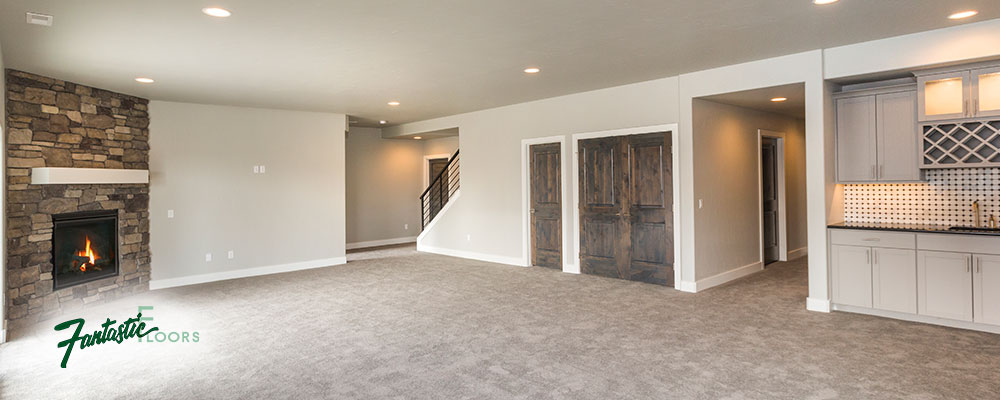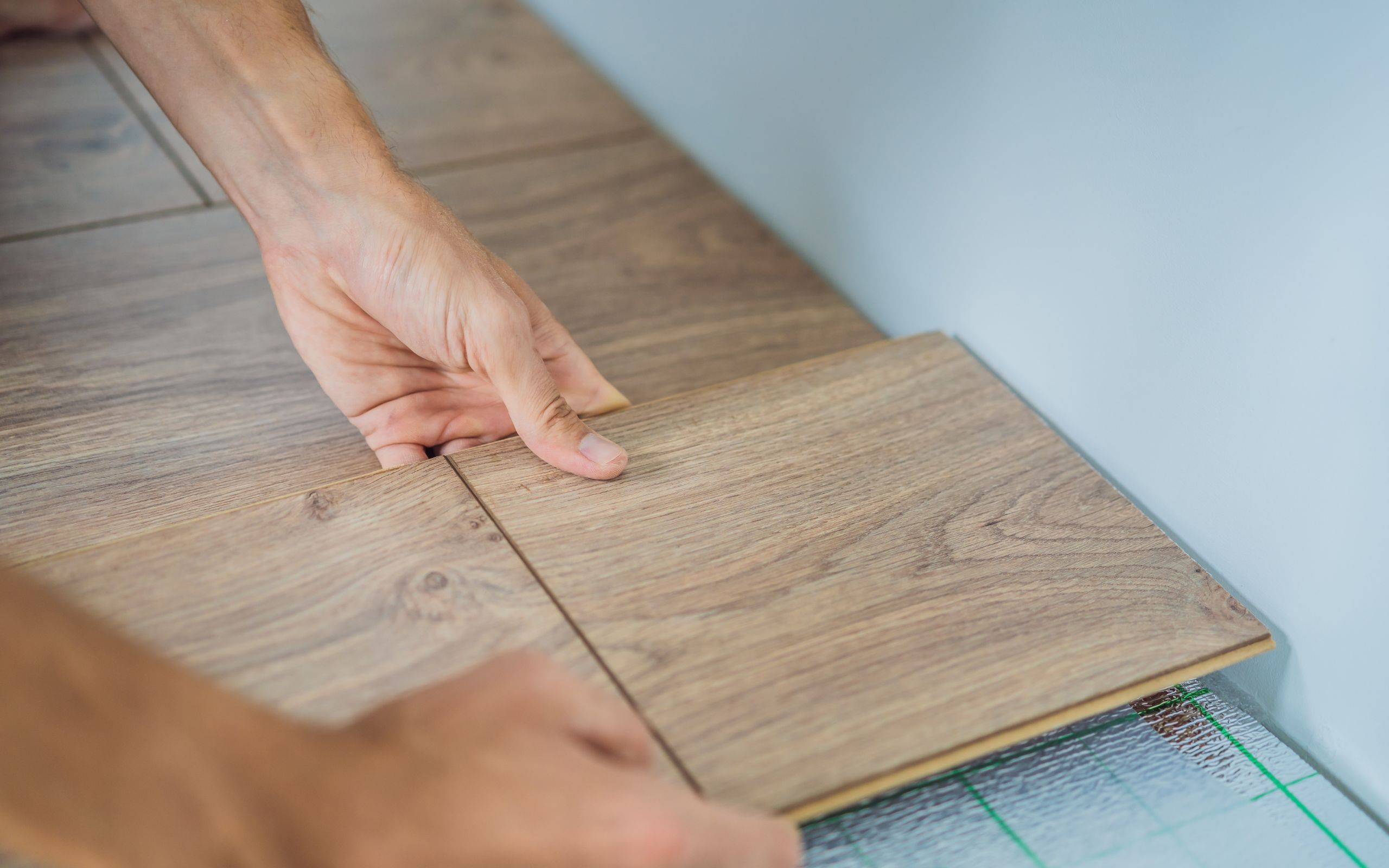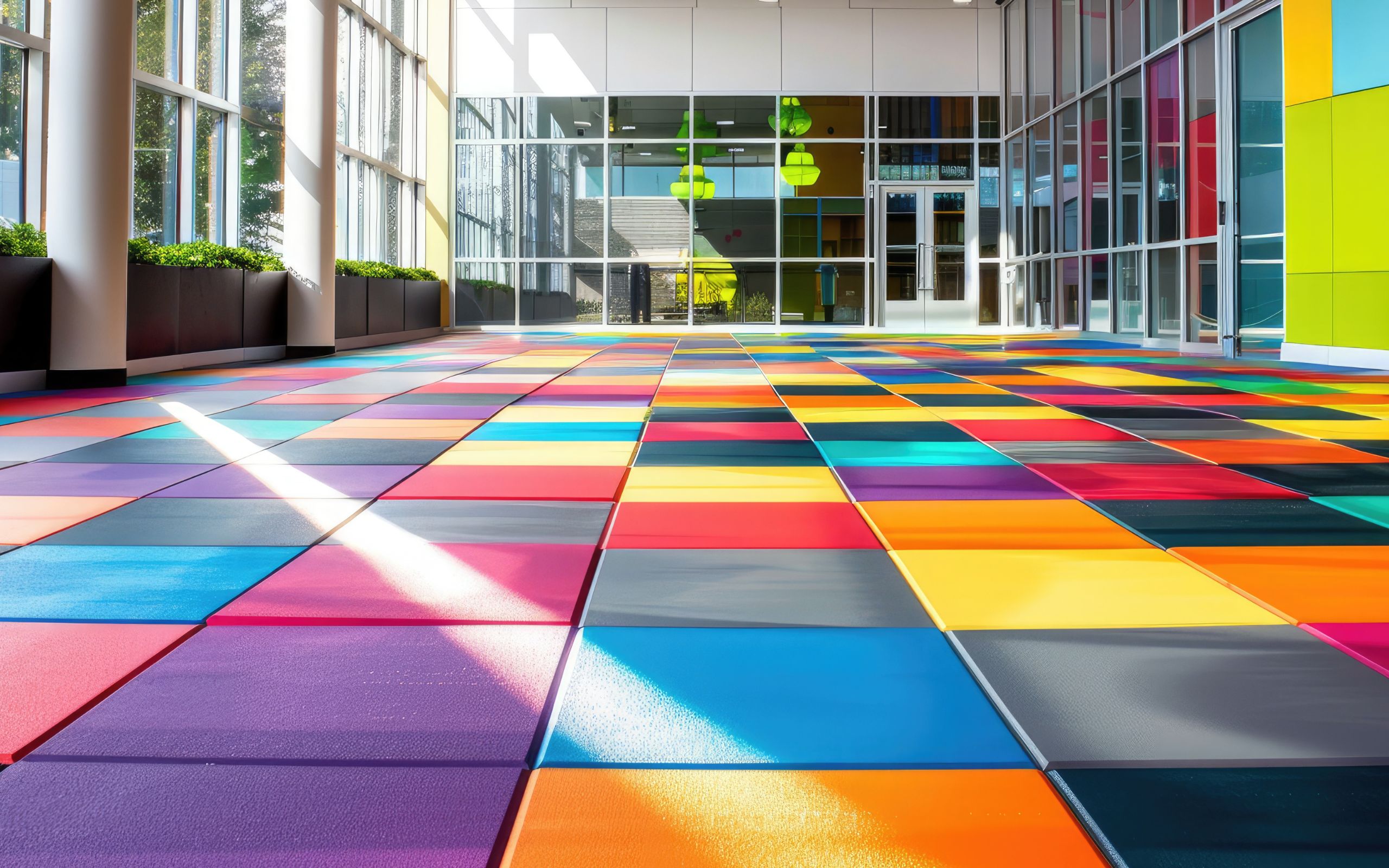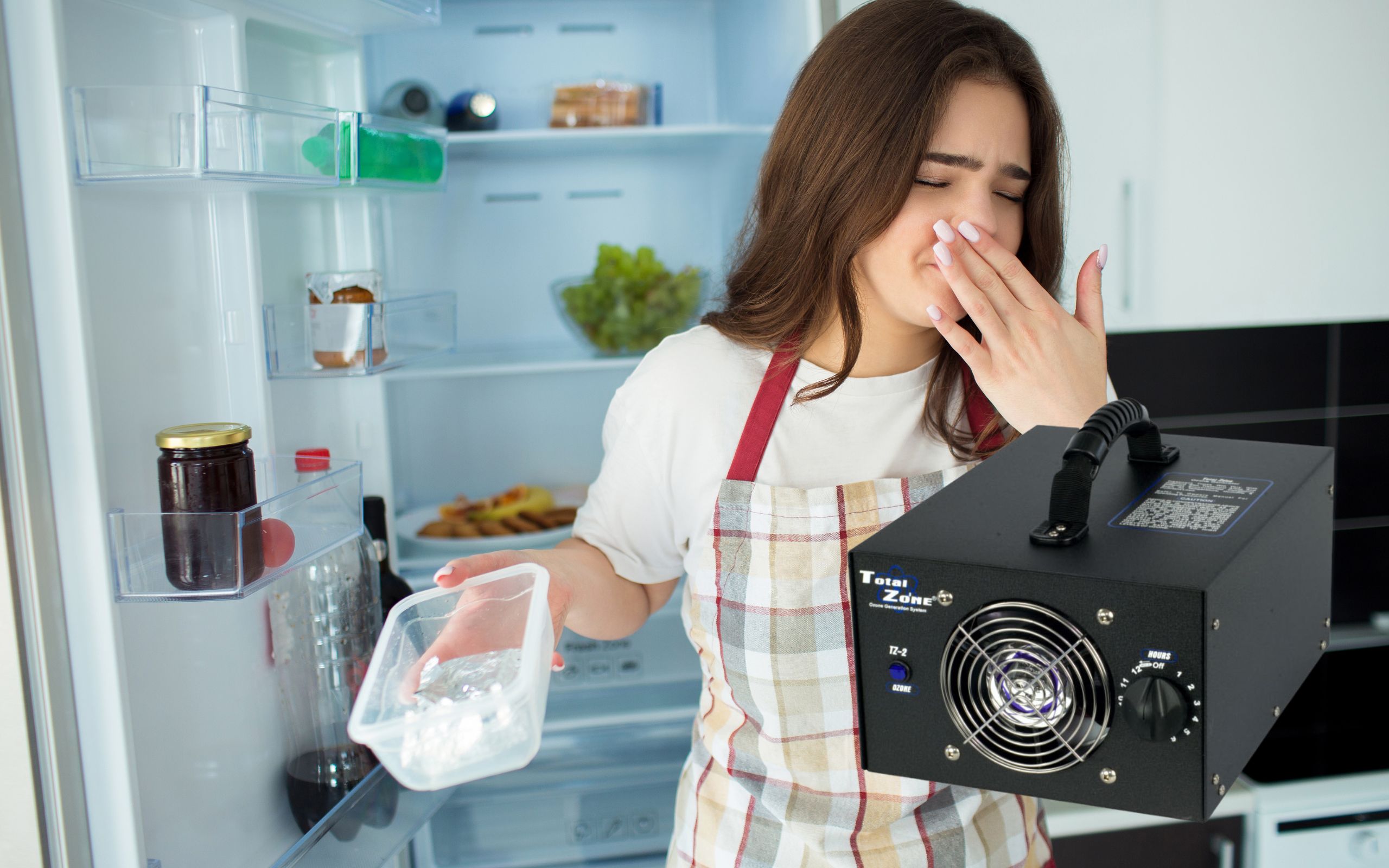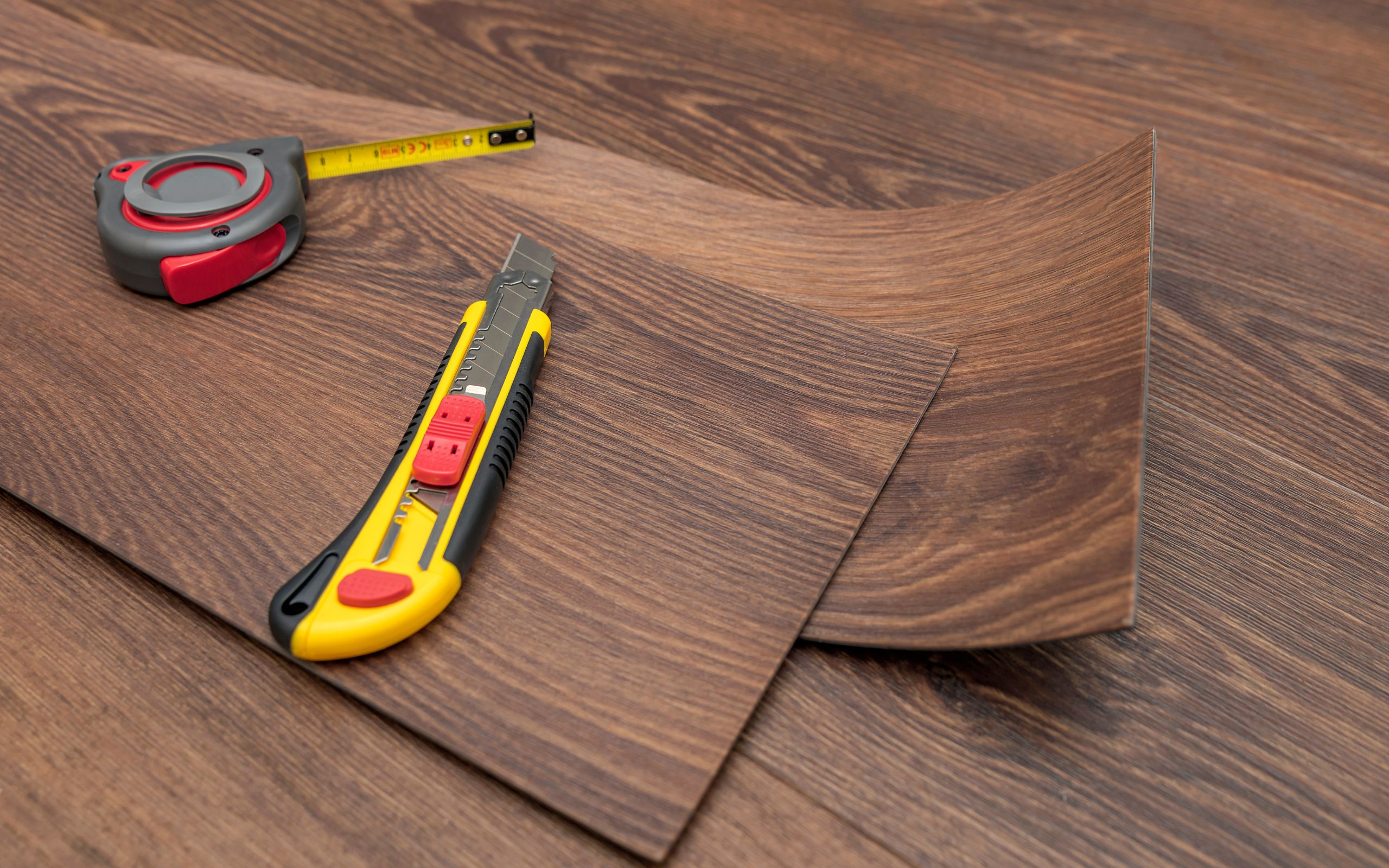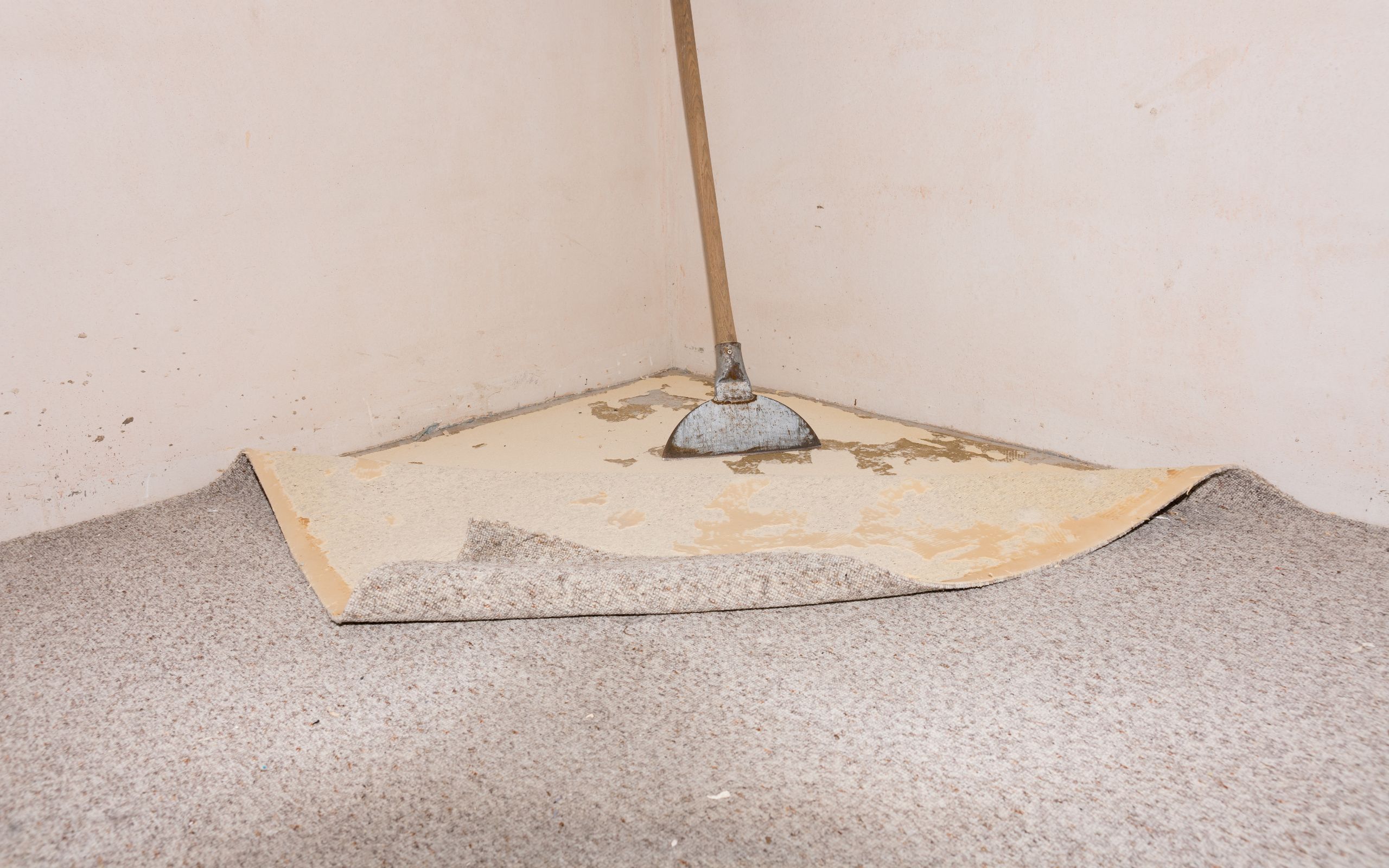Professional Floor Installation
1. Sheet Vinyl Flooring
Vinyl flooring, also known as resilient flooring, ranks with concrete and ceramic tile as one of the better basement flooring options. Vinyl flooring comes in both sheet or tile/plank form, and there is a subtle difference. Sheet vinyl flooring creates a nearly seamless, water-impervious surface on your basement floor, always a good thing where moisture might be involved. Tile vinyl flooring has multiple seams that may invite moisture infiltration if water is left standing long enough.
Pros
- Keeps water at bay
- Inexpensive, often pennies per square foot
- Warmer to the touch than ceramic tile or concrete.
Cons
- Often considered a cheap fix
- Needs a very clean surface for adhesion
- Sheet vinyl installation is not usually a do-it-yourself project
2. Ceramic or Porcelain Tile Flooring
Of all the basement flooring options, tile represents the best of many worlds. It qualifies as a finished surface, meaning that it is not a raw surface, like concrete. Yet this is a finished surface that is attractive on its own; it needs no additional treatment as concrete does.
Ceramic or porcelain tile can be installed directly on your concrete slab. Because tile on concrete can be cold, radiant heating can be sandwiched between the concrete and the tile to warm the tile surface.
Pros
- Dries out and is undamaged in the event of flooding
- Laying tile in small areas can be a do-it-yourself project
- Will never develop rot
Cons
- Requires the addition of radiant heating if temperature is an issue
- Poor sound absorption qualities
- Installing large areas of tile can be a daunting task for do-it-yourselfers and may require professional work
- A concrete slab may need significant leveling and repair because there will be no intervening subfloor to compensate for slab problems
3. Engineered Wood Flooring
Since wood is derived from trees and is organic, it does not stand up well to prolonged moisture. Thus, solid hardwood is one of the worst basement flooring options. But engineered wood flooring is a different story. Engineered wood flooring is considered to be dimensionally-stable, as its cross-hatched plywood base below the real wood veneer maintains its shape when subjected to limited amounts of moisture.
Pros
- Holds up well to mild amounts of moisture
- One of the more attractive basement flooring options
- Excellent sound absorption qualities
Cons
- Must be installed on some type of subfloor
- One of the more expensive basement flooring options
- More difficult to take up in the event of water damage, since it is nailed or stapled to the subfloor
4. Luxury Vinyl Plank or Tile
Luxury vinyl flooring is a more recent category of resilient flooring than the conventional type that is joined by adhesive to the subfloor. Instead, luxury vinyl is joined piece-to-piece in floating floor fashion. Another major difference is that luxury vinyl flooring can look remarkably similar to the material it is replicating, whether wood or stone.
Wood-look luxury vinyl comes in planks around 6 inches by 48 inches. Because it is relatively thick, it can be deeply embossed for a texture that more closely resembles real wood grain. Stone-look luxury vinyl tile aims to replicate the look of slate, travertine, marble, and other popular stones, yet in the form of a vinyl tile. Stone-look luxury vinyl comes in square shapes sized 16-inch by 16-inch or smaller.
Pros
- Thick wear layer means greater durability than found in conventional sheet or tile vinyl flooring
- Overall thickness up to twice as thick as conventional tile or sheet flooring means a slightly warmer floor
- Many wood species and stones can look amazingly like the real thing
Cons
- Luxury tile may not result in a better resale value since some home buyers may consider vinyl tile an inferior material
- As a seamed floor covering, luxury vinyl plank and tile may leak moisture down to the subfloor in the event of flooding
- Higher cost for a product that is still essentially a vinyl tile
5. Concrete Flooring
With changing attitudes toward utilitarian surfaces, concrete has come into wider acceptance by homeowners. Concrete does not have to remain in its raw state. It can be painted or stained to give it a different appearance. In fact, if extensive patching is needed, then painting is the only way to cover up the patches.
Pros
- The most moisture-hardy basement flooring option around
- Requires the least amount of materials
- Does not require a sub-floor
Cons
- Coldest of all basement flooring options, with no way to heat it from below
- Poor sound quality, a huge deficit if you wish to install a home cinema in your basement
- Requires more labor than one might imagine because concrete must be intensively scoured and cleaned before it can be painted
6. Plank Tile Flooring
Plank-sized porcelain tile flooring is impervious to moisture and, with its sharply rendered graphics, looks surprisingly like real wood. It is popular and well-regarded as a highly durable surface. It is so durable that it is increasingly being installed in high-traffic areas like restaurants and other commercial spaces. The chief difference between plank tile and conventional tile is that plank's edges are rectified. These 90-degree edges mean that tiles are fitted edge-to-edge, with no mortared grout lines.
Pros
- Increasingly considered a status item, thus gaining a higher resale value
- Attractive aesthetics
- Waterproof
- Rectified edges mean smaller grout lines
Cons
- Usually more expensive than conventionally sized tile
- Because it is still ceramic tile, it feels cold underfoot unless you install radiant heating mats
7. Wall-to-Wall Carpeting
Wall-to-wall carpeting is often vilified as a poor flooring material in bathrooms. Rightly so. Carpeting dries slowly and can develop mold and mildew. When wet, it feels mushy and uncomfortable. But does this mean that carpet is also a bad basement flooring option?
With the exception of extreme circumstances like flooding, basements generally have less moisture than even your average bathroom. And with the installation of a solid subfloor system, wall-to-wall carpeting in basements can be made to work.
Carpeting in basements should be installed in a case-by-case manner. If your basement is completely dry all throughout the year, it may give you up to a decade of reliable service. But be prepared for having to replace the entire carpet in the event of a water-based catastrophe, like flooding from the exterior, a broken pipe, or a malfunctioning water heater.
One creative alternative to wall-to-wall carpeting is to install carpet squares. Unlike the super low-pile indoor-outdoor squares that have been carpeting basements for decades, newer carpet squares are thicker and more attractive. In the event of flooding, carpet squares will get just as soaked and ruined as wall-to-wall carpet. But you can selectively pull up and replace carpet squares. It's more difficult to excise and replace portions of wall-to-wall carpeting.
Pros
- One of the warmest basement flooring options, even without installation of radiant heating
- Improves sound quality for home theaters
- A great option if you have small children who play on the floor
Cons
- Fairly expensive, especially if you opt for thicker piles and padding
- Though carpet can dry, it often takes industrial-quality drying equipment or services to get the job done fast enough before mold develops.
8. Laminate Flooring
Laminate flooring is more attractive than ever before, due to improved image layer graphics and thicker surfaces for deeper embossing. But underneath, it is still susceptible to moisture problems. When laminate's base material comes into prolonged contact with water, it will swell up and stay that way permanently. No amount of drying will cause the laminate to return to its previous size. In addition, the top image and wear layers will begin to peel off. The only way to fix water-damaged laminate flooring is to completely replace it.
Conventional laminate flooring in the basement can be made to work with the installation of a proper subfloor system. The subfloor and the laminate's foam underlayment protect against water vapor coming up from the concrete slab. Also, in the event of very minor flooding, the subfloor system will elevate the laminate flooring above the water.
Waterproof laminate has no wood content, so it will not swell and distend. However, it is still a product in search of a buying audience. It is difficult to obtain in North America, and the brands that are available have only limited design options.
Pros
- Laminate flooring rates as one of the warmer basement flooring ideas because of its foam underlayment
- Easy do-it-yourself installation
- Fair sound absorption qualities
Cons
- Highly susceptible to water damage
- Subfloor installation is not required but highly recommended
- Hollow feeling underfoot
- Can build up static electricity
9. Rubber Flooring
Rubber flooring is commonly associated with gyms, garages, dance or martial arts studios, and pools. Can rubber flooring work in basements, too?
If your basement is intended to be a play space, not a formal living space, you just might be in luck. Otherwise, rubber flooring will not work for most homes. Roll rubber, the type found at commercial gyms, offers the fewest number of seams. Interlocking rubber tiles cost about the same and are easy for homeowners to install since they fit together like a puzzle.
Pros
- Maximum insulation against basement subfloor temperatures
- Soft surface for walking on
- Stands up well against moisture
Cons
- Aesthetically not appropriate for living spaces as it is more for exercising or storage
- Not completely waterproof as water can still leak between seams, especially with the interlocking rubber tiles
10. Cork Flooring
Cork is a natural product derived from cork trees. Soft underfoot, comfortable to walk on and warm, cork flooring would ordinarily be a good fit for below-grade areas except that it is an organic product subject to water damage. If you do decide to install cork flooring in your basement, you would absolutely need to install a subfloor system.
Pros
- Cork provides good insulation against cold basement floors
- Soft to walk on
- Good sound absorption
Cons
- Since cork is organic, it is prone to deterioration
- Rolled cork can be hard to install on a do-it-yourself basis, typically requiring professional installation
Source: thespruce
About Fantastic Floors, Inc. We are a successful company with more than 25 years of experience in the market, we have the infrastructure, high quality equipment, materials and supplies to achieve and exceed the expectations of our customers, allowing us to gain the confidence and loyalty for our services.
We have more than 500 residential, 300 properties and 25 commercial customers totally satisfied with our services.
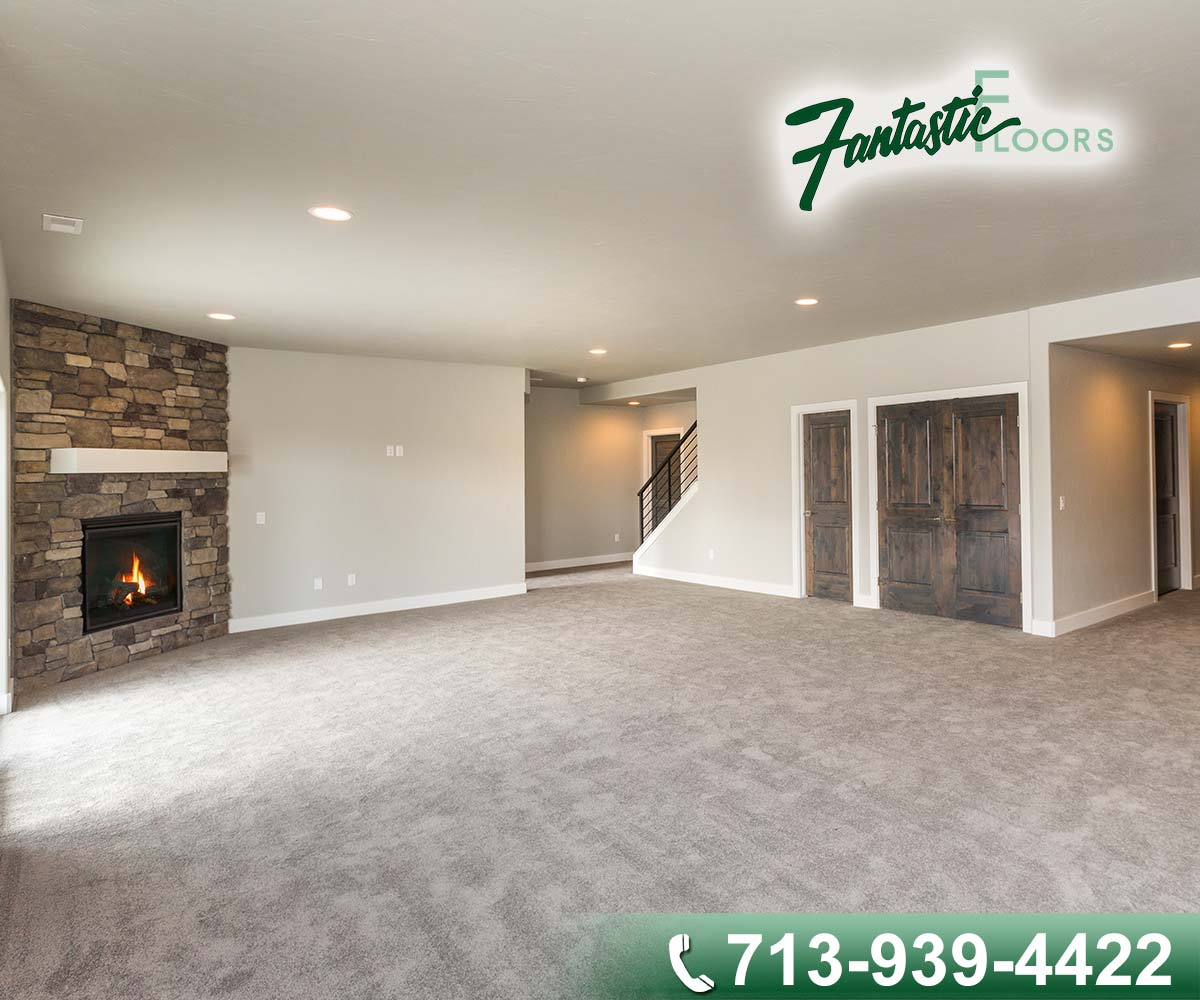
Professional Floor Installation.
Carpet Cleaning in Houston, Best Carpet Cleaning in Houston, Best Carpet Shampoo, Cheapest carpet Cleaning, Top Rated carpet Cleaning, Affordable Carpet Shampoo, Cost of Carpet Cleaning, Local Carpet Cleaning, Residential Carpet Cleaning, Carpet Cleaning Companies, Steam Clean, Special Carpet Cleaning, A/C Duct Cleaning, Best Carpet Installation, Professional Carpet Installation, Top Rated Carpet Installation, Cheap Carpet, 10 Best Carpet Installers, Custom Carpets, Carpet Installation, Carpet Sales, Carpet Contractors, Houston Carpets, Carpet Companies, Commercial Carpet, Best carpet Installation, Best Floor Installation, Professional Floor Installation, Top Rated Floor Installation, Cheap Home Flooring, 10 Best Floor Installers, Custom Floors, Carpet Installation, Flooring, Flooring Contractors, Houston Floors, Flooring Companies, Cheap Flooring Pros, Commercial Carpet, Commercial Flooring, Best carpet Installation, Wood Floor Installation, Hardwood Floor Installation, Laminate Installation, Floor Installation, Carpet Sale, Ceramic Tile Sale, Porcelain Tile Sale, Wood Floors Sale, Laminate Sale, Sheet Vinyl Sale, Vinyl Tile Sale, Vinyl Plank Sale, Fantastic Floors Inc.
